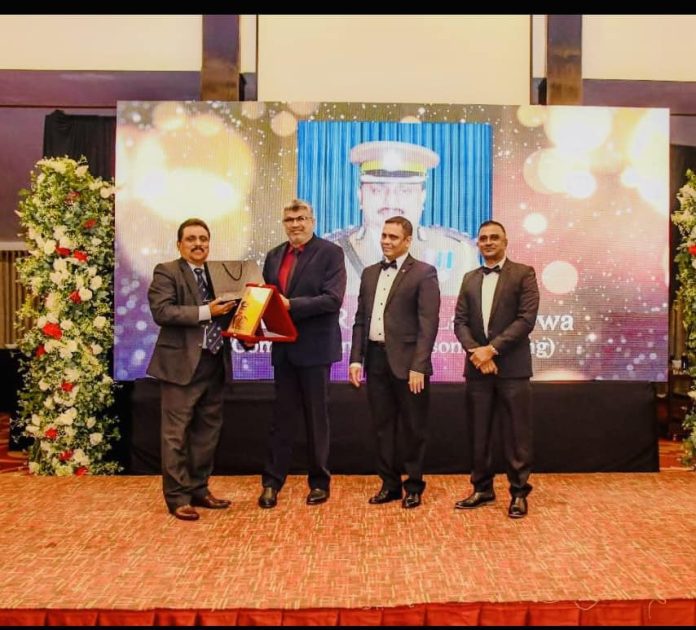Justice Minister Harshana Nanayakkara will soon release a statement addressing the controversy surrounding his participation in a recent felicitation ceremony where an award was presented to former Commissioner of Prisons Emil Ranjan Lamahewa.
The award, prepared by the Prisons Department, was reportedly given without the prior knowledge or consent of the Justice Minister, Deputy Minister of Public Security Sunil Watagala said.
Speaking during a political programme hosted by a private television channel, Watagala clarified that the organisers of the event had failed to inform the Justice Minister about the inclusion of Lamahewa in the list of honourees. He added that the Justice Minister would soon issue a formal statement on the matter.
How the Controversy Began
The incident drew criticism from journalists, civil society activists, and the public after photos of the annual ceremony began circulating online, including one showing Minister Nanayakkara handing a plaque of appreciation to Lamahewa.
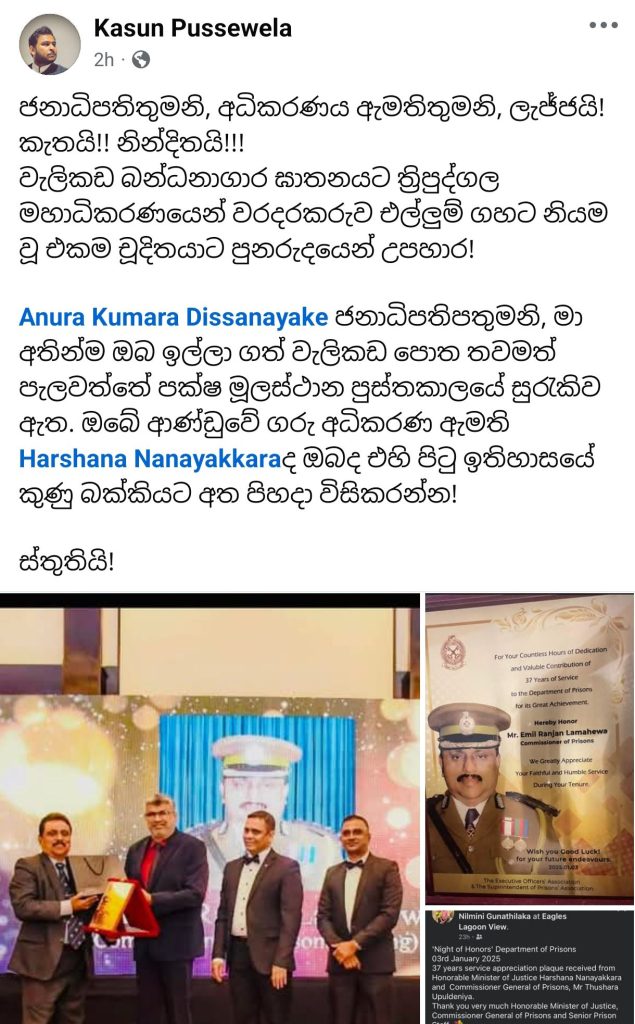
The ceremony, which recognised five other retired prison superintendents and commissioners for their service, became controversial due to Lamahewa’s involvement as a key suspect in the 2012 Welikada prison massacre, where Lamahewa was the Superintendent of Magazine Prison.
Lamahewa later posted photos of the event on his Facebook page, sharing images and stating that the award was a recognition of his 37 years of service.
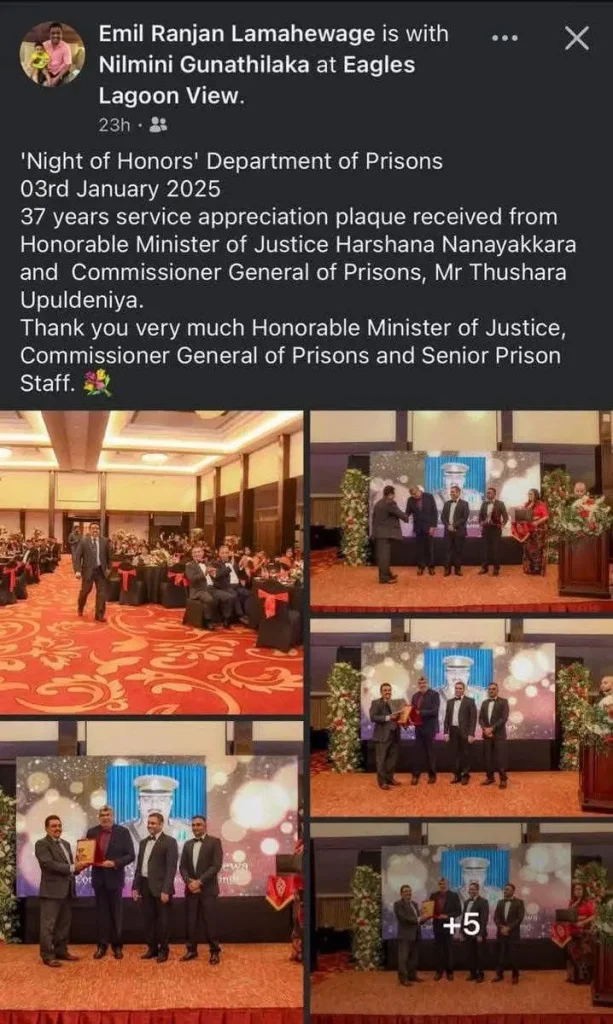
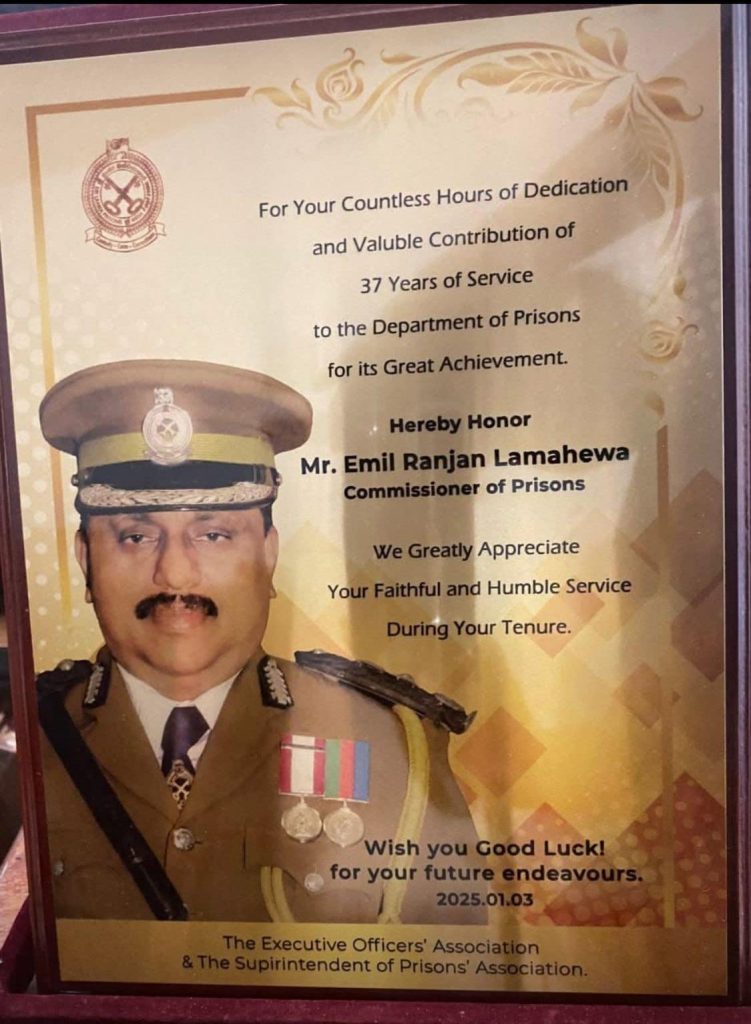
Meanwhile, Prisons Spoeksperson Gamini B. Dissanayake speaking to BBC Sinhala Service has said that the Supreme Court had acquitted him of all charges.
“He has been acquitted according to the Supreme Court’s decision. Further accusations against someone who has been cleared by the court are, in my view, an insult to the judiciary,” he said.
“This was not an event organised specifically for him (Lamahewa). Every year, the association of staff officers of the Prisons Department holds a gathering to foster camaraderie among its members. These meetings are attended by staff officers of the department and their families.
Last year, a similar event was held at a hotel in the Katunayake area, attended by the former Minister of Justice and Prisons, Wijeyadasa Rajapakshe, and the Secretary of the Ministry.
As part of the tradition, mementoes are given to retired officers and members of the association. Since Emil Ranjan was in prison at the time of last year’s event, we did not have the opportunity to present him with a souvenir. That’s why it was given to him on this occasion,” the Prisons Spokesperson explained to BBC Sinhala.
The Welikada Prison Massacre and Legal Proceedings
Emil Ranjan Lamahewa was one of the main accused in the Welikada prison massacre of 2012, during which 27 prisoners were killed and over 40 others sustained injuries during a search operation conducted by the Police Special Task Force (STF).
The operation, which took place on 9 November 2012, targeted illegal weapons allegedly held by inmates. In 2019, the Attorney General filed a case against Lamahewa and Neomal Rangajeewa, a former police inspector of the Police Narcotics Bureau.
The Attorney General filed indictments before a Trial-at-Bar against Rangajeewa, former Superintendent of Magazine Prison Lamahewa, and Indika Sampath, an officer attached to the Prisons intelligence unit, under 33 counts, including committing murder and conspiring to commit murder as members of an unlawful assembly.
The three-year trial was conducted before a High Court bench comprising Gihan Kulatunga, Pradeep Hettiarachchi, and Manjula Thilakaratne. While Rangajeewa was acquitted due to a lack of direct identification by witnesses, Lamahewa was found guilty of one of the charges and sentenced to death.
The court’s decision was primarily based on the testimony of a witness, jailor Kuda Bandara, who claimed he saw prison inmate Kalu Thushara being abducted by Lamahewa along with a Major.
The jailer, Kuda Bandara, reported this incident to former Justice Minister Wijeyadasa Rajapakshe, prompting the formation of a committee to investigate the matter. The evidence collected by this committee, along with findings from the Criminal Investigation Department’s investigations, formed the basis for the Attorney General to file the case.
Rangajeewa, the first accused, was ordered to be acquitted and released from all charges by the Trial-at-Bar as the prosecution failed to prove its case beyond a reasonable doubt.
Lamahewa was later acquitted on 8 August 2024 by a five-member Supreme Court bench.
What Happened on 9 November 2012?
On the day of the massacre, approximately 700 STF officers entered the Welikada prison in Colombo to conduct a search operation targeting illegal weapons and contraband held by prisoners. The operation initially proceeded without incident as officers searched the ward housing high-risk inmates and confiscated prohibited items such as mobile phones.
However, tensions escalated when officers entered the Chapel Ward, which housed death row inmates and those serving life sentences. Violence erupted, culminating in the deaths of 27 prisoners and injuries to over 40 others.
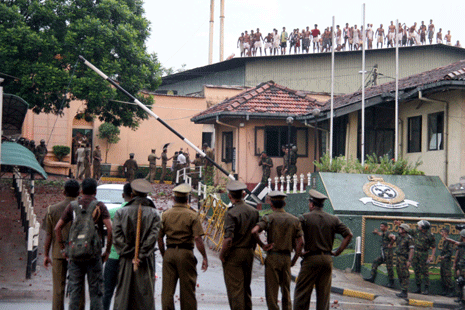
The event, widely known as the 2012 Welikada prison riot, garnered both national and international attention.
No one has been convicted for the Welikada massacre.
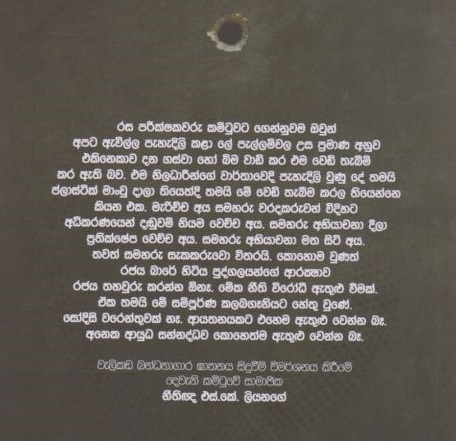
Why Lamahewa Was Acquitted
The Supreme Court delivered this judgment pursuant to an appeal petition filed by Emil Ranjan Lamahewa challenging the Trial-at-Bar conviction and sentence. The Supreme Court’s five-judge bench comprised Justices Vijith K. Malalgoda, S. Thurairaja, Shiran Gooneratne, Achala Wengappuli, and Priyantha Fernando.
Justice Malalgoda observed that the illegalities in the Trial-at-Bar findings were fatal in nature, which permitted him to answer the questions of law in favour of the accused. Accordingly, the Supreme Court decided to set aside the conviction imposed on the accused by the Trial-at-Bar.
The 32-page Supreme Court verdict severely criticised certain parts of the three-judge High Court decision. The Supreme Court rejected the evidence of jailor Kuda Bandara, which had been accepted as reliable evidence by the High Court.
The Supreme Court emphasised that if Kalu Thushara had been taken away by a child soldier and a major, the Attorney General should have prosecuted both individuals. The failure to prosecute the second person raised questions about the reliability of Bandara’s testimony.
Furthermore, the Supreme Court highlighted that Bandara did not testify about the incident during initial investigations conducted by the Colombo Crimes Division or the two committees that probed the matter.
The Supreme Court also noted the Attorney General’s failure to corroborate Bandara’s testimony with other evidence, such as summoning his wife to testify about the alleged threatening phone call.
In light of these deficiencies, the Supreme Court pointed out serious lapses in the Attorney General’s handling of evidence, leading to Lamahewa’s acquittal.
BY Methmalie Dissanayake


